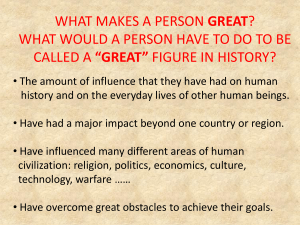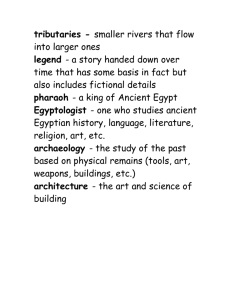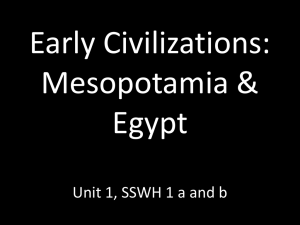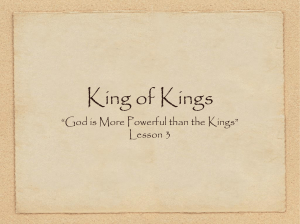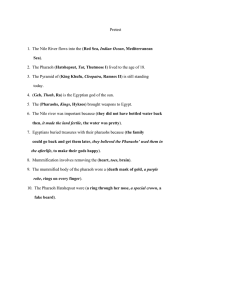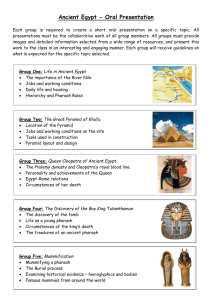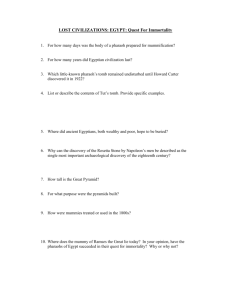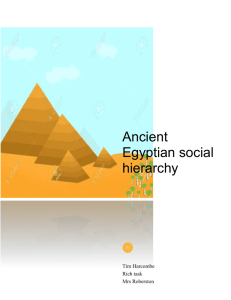TASTE TEXT of a
advertisement
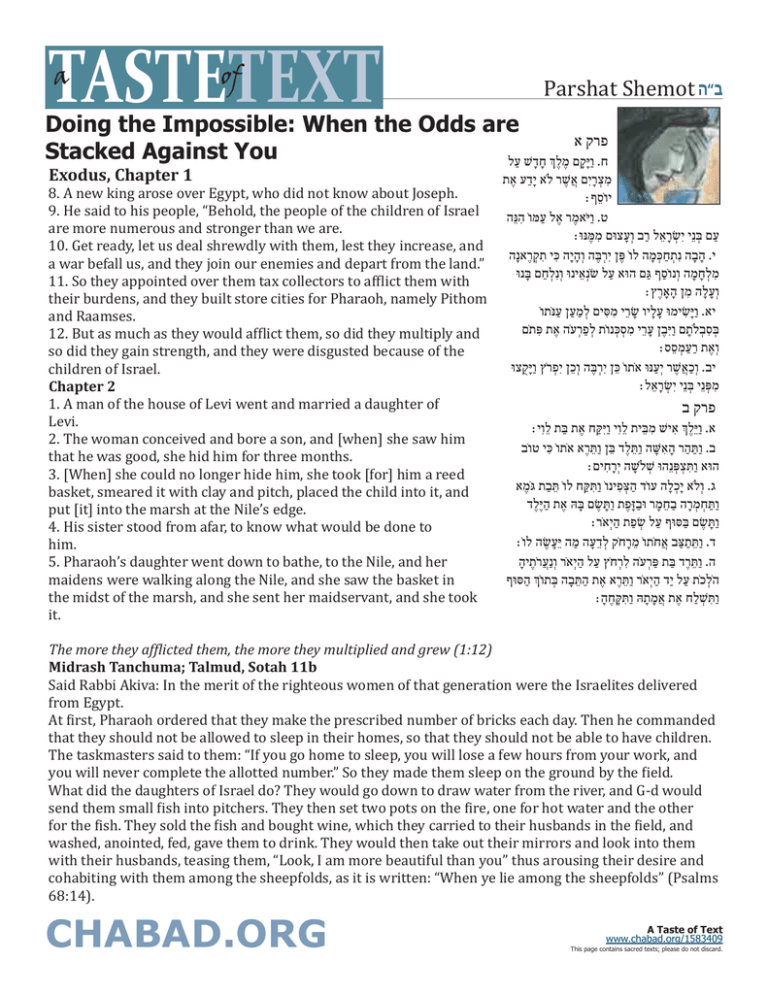
TASTETEXT a of Parshat Shemot ב”ה Doing the Impossible: When the Odds are פרק א Stacked Against You ַוּיָקָ ם מֶ לֶ ְך חָ דָ ׁש עַ ל.ח Exodus, Chapter 1 ִמצְ ָריִם אֲׁשֶ ר ֹלא יָדַ ע אֶ ת 8. A new king arose over Egypt, who did not know about Joseph. :יו ֹסֵ ף 9. He said to his people, “Behold, the people of the children of Israel ַוּי ֹאמֶ ר אֶ ל עַ ּמו ֹ הִ ּנֵה.ט are more numerous and stronger than we are. :עַ ם ּבְ נֵי י ְִׂשרָאֵ ל רַב וְעָ צּום ִמּמֶ ּנּו 10. Get ready, let us deal shrewdly with them, lest they increase, and הָ בָ ה נִ תְ חַ ּכְ מָ ה לו ֹ ּפֶ ן יִרְ ּבֶ ה ְוהָ יָה ּכִ י תִ קְ רֶאנָה.י a war befall us, and they join our enemies and depart from the land.” ִמלְ חָ מָ ה וְ נו ֹסַ ף ּגַם הּוא עַ ל ׂש ֹנְ אֵ ינּו ְונִלְ חַ ם ּבָ נּו 11. So they appointed over them tax collectors to afflict them with :וְ עָ לָ ה ִמן הָ ָארֶץ their burdens, and they built store cities for Pharaoh, namely Pithom ֹ ו ֹת ּנ ַע ן ַע ַמ ְל ים ִּס מ ִ ֵי ר ָׂש יו ָ ַוּי ִָׂשימּו עָ ל.יא and Raamses. ּבְ סִ בְ ֹלתָ ם ַוּיִבֶ ן עָ רֵי ִמסְ ּכְ נו ֹת לְ פַ רְ ע ֹה אֶ ת ּפִ ת ֹם 12. But as much as they would afflict them, so did they multiply and :וְ אֶ ת רַעַ ְמסֵ ס so did they gain strength, and they were disgusted because of the וְ כַ אֲׁשֶ ר יְעַ ּנּו א ֹתו ֹ ּכֵ ן יִרְ ּבֶ ה וְכֵ ן יִפְ ר ֹץ ַו ָּיקֻצּו.יב children of Israel. :ִמּפְ נֵי ּבְ נֵי י ְִׂשרָאֵ ל Chapter 2 1. A man of the house of Levi went and married a daughter of פרק ב Levi. : ַוּיֵלֶ ְך אִ יׁש ִמּבֵ ית לֵ וִי ַוּיִּקַ ח אֶ ת ּבַ ת לֵ וִי.א 2. The woman conceived and bore a son, and [when] she saw him וַּתַ הַ ר הָ אִ ּׁשָ ה וַּתֵ לֶ ד ּבֵ ן וַּתֵ רֶא א ֹתו ֹ ּכִ י טו ֹב.ב that he was good, she hid him for three months. :הּוא וַּתִ צְ ּפְ נֵהּו ְׁשֹלׁשָ ה ְיר ִָחים 3. [When] she could no longer hide him, she took [for] him a reed וְ ֹלא יָכְ לָ ה עו ֹד הַ ּצְ פִ ינו ֹ וַּתִ ּקַ ח לו ֹ ּתֵ בַ ת ּג ֹמֶ א.ג basket, smeared it with clay and pitch, placed the child into it, and וַּתַ ְח ְמרָה בַ חֵ מָ ר ּובַ ּזָפֶ ת וַּתָ ׂשֶ ם ּבָ ּה אֶ ת הַ ּיֶלֶ ד put [it] into the marsh at the Nile’s edge. :וַּתָ ׂשֶ ם ּבַ ּסּוף עַ ל ְׂשפַ ת הַ ְיא ֹר 4. His sister stood from afar, to know what would be done to :ֹ וַּתֵ תַ ּצַ ב ֲאח ֹתו ֹ מֵ ָרח ֹק לְ דֵ עָ ה מַ ה ּיֵעָ ׂשֶ ה לו.ד him. ָ וַּתֵ רֶד ּבַ ת ּפַ רְ ע ֹה לִ רְ ח ֹץ עַ ל הַ ְיא ֹר ְו ַנ ֲער ֹתֶ יה.ה 5. Pharaoh’s daughter went down to bathe, to the Nile, and her ה ֹלְ כ ֹת עַ ל יַד הַ ְיא ֹר וַּתֵ רֶא אֶ ת הַ ּתֵ בָ ה ּבְ תו ְֹך הַ ּסּוף maidens were walking along the Nile, and she saw the basket in the midst of the marsh, and she sent her maidservant, and she took : ָוַּתִ ְׁשלַ ח אֶ ת אֲמָ תָ ּה וַּתִ ּקָ חֶ ה it. The more they afflicted them, the more they multiplied and grew (1:12) Midrash Tanchuma; Talmud, Sotah 11b Said Rabbi Akiva: In the merit of the righteous women of that generation were the Israelites delivered from Egypt. At first, Pharaoh ordered that they make the prescribed number of bricks each day. Then he commanded that they should not be allowed to sleep in their homes, so that they should not be able to have children. The taskmasters said to them: “If you go home to sleep, you will lose a few hours from your work, and you will never complete the allotted number.” So they made them sleep on the ground by the field. What did the daughters of Israel do? They would go down to draw water from the river, and G-d would send them small fish into pitchers. They then set two pots on the fire, one for hot water and the other for the fish. They sold the fish and bought wine, which they carried to their husbands in the field, and washed, anointed, fed, gave them to drink. They would then take out their mirrors and look into them with their husbands, teasing them, “Look, I am more beautiful than you” thus arousing their desire and cohabiting with them among the sheepfolds, as it is written: “When ye lie among the sheepfolds” (Psalms 68:14). CHABAD.ORG A Taste of Text www.chabad.org/1583409 This page contains sacred texts; please do not discard. TASTETEXT a of ב”ה There went a man of the house of Levi, and took to wife a daughter of Levi (2:1) Talmud, Sotah 12a Where did he go? He went in the counsel of his daughter. Moses’ father, Amram, was the greatest man of his generation; when he saw that the wicked Pharaoh had decreed “Every son that is born you shall cast into the river,” he said: In vain do we labor. He divorced his wife. All the Israelites thereupon arose and divorced their wives. Said his daughter to him: “Father, your decree is more severe than Pharaoh’s. Pharaoh decreed only against the males; you have decreed against the males and females. Pharaoh only decreed concerning this world; you have decreed concerning this world and the World to Come. In the case of the wicked Pharaoh there is a doubt whether his decree will be fulfilled or not; in your case, it will certainly be fulfilled.” So Amram went and remarried his wife; and they all arose and took back their wives. Why is she called “a daughter of Levi”? She was one hundred and thirty years old! Because the signs of maidenhood were reborn in her. [Pharaoh’s daughter] saw the box among the rushes, and she sent her maid (“ammatah”) to fetch it (2:5) Rashi Another interpretation of this verse renders the Hebrew word ammatah as “her arm” rather than “her maid.” Ammatah also means “arm lengths.” This is to teach us that “her arm was extended for many armlengths” (to enable her to reach the basket). Rabbi Menachem Mendel of Kotzk If Moses’ basket lay beyond her reach, why did Pharaoh’s daughter extend her arm? Often, we are confronted with a situation that is beyond our capacity to rectify. By all natural criteria, the matter is simply beyond our reach. But Pharaoh’s daughter heard a child’s cry and extended her arm. An unbridgeable distance lay between her and the basket containing the weeping infant, making her action seem utterly pointless. But because she did the maximum of which she was capable, she achieved the impossible. Because she extended her arm, G-d extended its reach, enabling her to save a life and raise the greatest human being ever to walk the face of the earth. …The bush was burning in the fire, but the bush was not consumed. And Moses said: Let me move away from here and see this great sight…”—Exodus 3:2-3. Rashi I will turn from here, to approach there. Keter Shem Tov Not satisfied with his prior spiritual accomplishments, Moses was willing to abandon all his preconceived notions of reality in order to understand the anomaly of the burning bush. SUMMARY • When confronted with a situation that seems hopeless, don’t resign yourself to inactivity with the excuse that the little you can do, can’t possibly make a difference. • Our small actions may seem pointless. But with G-d’s help, we can achieve the impossible. • Someone who wishes to behold the divine, must move from his present way of looking at things and open himself up to a new perspective. CHABAD.ORG A Taste of Text www.chabad.org/1583409 This page contains sacred texts; please do not discard.
